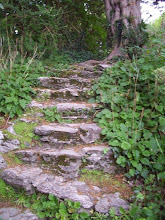★★★★★★★★★★ (9/10)
This was fantastic, to put it simply and plainly. It seems that it's always the bits of hidden history that intrigue me the most. As an American, I know little enough about the British monarchy, other than the significant events (wars, controversial successions, the times before and after Elizabeth I, etc.), so it came as no surprise to me that I had no clue of the mistresses of King Charles II. Still, Bagwell's accounts of Nell Gwynn's life brought me near tears, summoned many hearty guffaws, and made me wish I could have been a spectator of court life during Gwynn's time.
Nell Gwynn's story should be one that fills a person with pity for the life she could have faced. She willingly went into prostitution at a young age to escape the nearly daily beatings by her mother, only to put herself in a world filled with abuse, uncertainty, and odd friendships. What I found amazing about her is that she never gave up. Even when Jack, the man who helped keep the girls at the brothel safe (I use that term loosely, given his own character), brutally rapes her for days, she knows that things will get better somehow, and that somehow was the theater. Luckily for Nell, the return of the monarchy brought the both the return of the theater, and the introduction of women onto the British stage. She moved into that life easily, and was a great actress; people loved her as much as she loved performing for them.
Regardless of her fame as an actress, Bagwell's description of her as a character makes Nell truly inspiring. She was a unique woman, in my opinion. Though she sold herself to rich men to make money, she usually cared for the ones that cared for her. There was usually a friendship before anything else. For example, when she agreed to become Dorset's mistress, she had already known him for a while, and was his friend; being his mistress came as a way to make money while the theaters were closed during the plague, and she enjoyed his company as much as he did hers. Her emotions ran deep through her entire life. She loved deeply and was a fierce friend to all who offered her friendship. I can't even express properly how I see her relationships with those around her. It's enough that I believe that if I had known her, I would have loved her as well, because she was the type of person that you couldn't help but like. She was kind, generous, friendly, and loyal, even when she didn't have to be.
Her relationship with Charles took up the bulk of the plot, and like any good work of historical fiction, there was a bit of history thrown in. Assassination plots, intrigues, betrayal, murder, duels, and the ever-changing alliances of the courtiers all play important parts in Nell's life once she becomes the king's kept woman. Events important to Charles's reign were included because they affected Nell. When there was a threat to his life, Nell was sure to be told of it, and would have been told by Charles how he felt about it. He confided in her his frustrations with Parliament, as well as with his family, and the controversy over who would succeed him since he and his queen were childless. (I didn't know that Charles's brother, James, became king after him. I had always assumed it was a son, since that usually what happens.) Nell was there during this time of turmoil, and her response to it wasn't what I expected. She behaved practically, and looked to the future, rather than the present or the past for answers and hopes.
She lived the life of a grand lady, but she never really thought of herself as one. She considered herself lucky, and unlike the king's other mistresses (of which there were many), Nell rarely asked for things; she was happy enough with the king's company, and whatever he thought fit to give her. Of course, I'm comparing her to the other women Bagwell puts in the novel: Barbara Palmer (who is the king's mistress when he returns to England from his exile in France), Louise de Keroualle (an impoverished, but beautiful and young, French noble, who came to England in search of a rich husband), Moll Davis (another actress), and Hortense Mancini (who Charles reportedly wanted to marry when he was younger, but she refused). These women (except Moll) were born into wealth, and expected extravagance from the king, as well as the ability to influence him; Nell expected none of this, and had no idea that she would come to love Charles as deeply as she did. It's amazing that knowing the right people can take you from a brothel, to the theater, to a king's mistress, in less than five years. I can't say that I'd have wanted to be her, but she did live a charmed life, considering her prospects when she was born.
I though this was a wonderfully written novel, and loved every page. As with other historical novels that I've read, I learned a bit of history, that only helped to enrich my understanding of what life would have been like for a woman such as Nell. I will definitely read this again, and hope to do that soon. Not only did I enjoy reading The Darling Strumpet, I started doing research on King Charles II, his mistresses, and the wars of the time. Maybe I should have become a historian...
Thursday, May 26, 2011
Subscribe to:
Post Comments (Atom)


1 comments:
Sounds interesting. I've recently really gotten into ready historical fiction about the various English monarchs. Will def. check this out.
Post a Comment